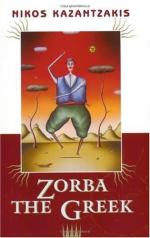| Name: _________________________ | Period: ___________________ |
This test consists of 5 multiple choice questions, 5 short answer questions, and 10 short essay questions.
Multiple Choice Questions
1. What miracle do the monks come down from the mountain to share?
(a) The Holy Virgin of Revenge has killed an army of invaders.
(b) The Holy Virgin of Revenge has killed Zaharia.
(c) Zaharia saved a man through meditation.
(d) Zaharia has reached enlightenment.
2. Who does the narrator see as he is walking toward the village on Easter?
(a) Madame Hortense.
(b) Buddha.
(c) The widow.
(d) Zorba.
3. What news does the monk Zaharia bring in Chapter 24?
(a) He wants to become a lignite miner.
(b) He robbed the monastery.
(c) He has burned down the monastery.
(d) He has quit his life at the monastery.
4. What do the narrator and Zorba do on Easter Sunday?
(a) Make a feast for Madame Hortense.
(b) Make a feast for the village orphans.
(c) Swim in the ocean.
(d) Walk into Candia.
5. From whom must Zorba and the narrator rent land for the timber rail project?
(a) Anagnosti.
(b) Madame Hortense.
(c) The governor of Crete.
(d) Monks at the monastery.
Short Answer Questions
1. For what action does Zorba grow proud of the narrator?
2. Who does Zorba adopt when Hortense dies?
3. After sleeping with the widow, what does the narrator realize?
4. Why does the narrator call a doctor on Easter?
5. How does Zorba feel about the narrator's false promises made while Zorba was in Candia?
Short Essay Questions
1. Describe what happened while Zorba was at war that changed his mind about judging a person based on nationality.
2. After the widow's murder, what happens when Zorba and Manolakas meet near the widow's garden?
3. Why does Zaharia say he became a monk?
4. In Chapter 16, what did the sleeping workmen do who when they heard Zorba playing his Santuri?
5. In his third theory of religion, what does the bishop give as God's reason for sending religion to the masses?
6. How does the narrator describe eternity in Chapter 15?
7. What story does Zorba tell in Chapter 20 that supports the theme that appearance creates reality?
8. Why does Anagnosti say that Pavli is blessed?
9. When writing letters to Madame Hortense, what does the narrator have to do?
10. How are Zorba's final moments described?
Multiple Choice Answer Key
| 1. B 2. C 3. C 4. A 5. D |
Short Answer Key
1. For what action does Zorba grow proud of the narrator?
The narrator finally pursues the widow.
2. Who does Zorba adopt when Hortense dies?
Dimitri.
3. After sleeping with the widow, what does the narrator realize?
"The soul is flesh as well."
4. Why does the narrator call a doctor on Easter?
Madame Hortense has grown very ill.
5. How does Zorba feel about the narrator's false promises made while Zorba was in Candia?
He is angry but willing to follow through on the promise.
Short Essay Answer Key
1. Describe what happened while Zorba was at war that changed his mind about judging a person based on nationality.
While at war, Zorba murdered a Bulgarian priest who had been invading Greek villages and killing Greeks. Later, when Zorba sees the orphans of the priest, he realizes that nationality doesn't matter. Rather, "good" and "bad" are the only important classifications to consider.
2. After the widow's murder, what happens when Zorba and Manolakas meet near the widow's garden?
Manolakas challenges Zorba to a knife fight after having been beaten previously. Zorba tells him he will fight without weapons. Then the narrator intervenes and talks them down from fighting at all. They end up all drinking together.
3. Why does Zaharia say he became a monk?
He says poverty led him to become a monk. He was hungry and knew that if he went into the monastery there would be no way he could starve.
4. In Chapter 16, what did the sleeping workmen do who when they heard Zorba playing his Santuri?
They got up, circled around him and began dancing to the music he played.
5. In his third theory of religion, what does the bishop give as God's reason for sending religion to the masses?
He says that God sent religion as an act of mercy for the masses in order that they might experience living in "eternity." The bishop believes that only a few people on earth are able to live an eternity during their natural lives on earth.
6. How does the narrator describe eternity in Chapter 15?
He describes it as being each minute that passes.
7. What story does Zorba tell in Chapter 20 that supports the theme that appearance creates reality?
Zorba tells a story in which his grandfather takes a piece of wood, calls it part of the True Cross, and declares that it will protect the soldier to whom he gifts it from all harm in battle. The soldier then becomes a brave and invincible warrior simply because he believes that he has nothing to fear.
8. Why does Anagnosti say that Pavli is blessed?
Pavli commits suicide by drowning, and Anagnosti says that he is blessed because he is free from the object of his desire, the widow. Anagnosti claims that Pavli could not have lived happily with or without her because he had so much passion for her but now he is at peace.
9. When writing letters to Madame Hortense, what does the narrator have to do?
The narrator must pretend he is Zorba. Therefore, he must take on Zorba's characteristics in his writings while looking for the best in Madame Hortense.
10. How are Zorba's final moments described?
Zorba dies howling and laughing like an animal.
|
This section contains 777 words (approx. 3 pages at 300 words per page) |




